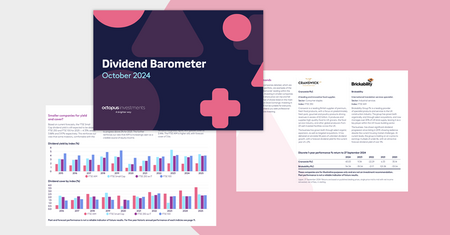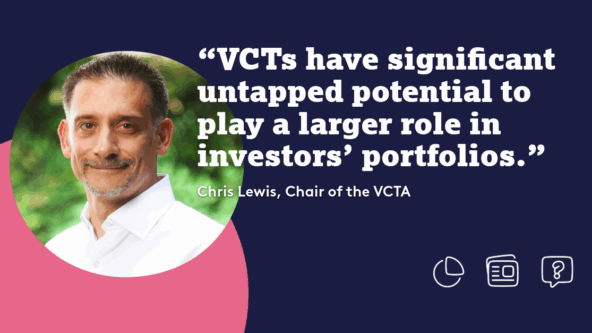Venture Capital Trusts (VCTs) might not be something you recommend every day, but they warrant attention. Read on to find out why.
There’s certainly good appetite from advisers and clients right now who are seeking products with strong post-tax outcomes and diversification. They’re so in demand in fact, that over £800m was invested into VCTs in the 2023/24 tax year1.
So why should you consider VCTs for your clients this tax year? Here are a few of the reasons.
But first, a quick reminder of VCTs
VCTs are listed companies that invest in a diversified portfolio of early-stage businesses. They support growth and innovation in the UK by encouraging investment in smaller, unquoted, and AIM-listed companies.
Because these smaller companies are high risk, the Government offers VCT investors attractive tax reliefs (including 30% income tax relief and tax-free dividends) to compensate investors for some of the risk involved.
Since their introduction in 1995, VCTs have grown to become a mainstay of many advisers’ proposition. For suitable clients they are a valuable way to invest tax-efficiently for the future, and to diversify.
Understanding the risks:
- VCTs are high risk investments. The value of a VCT investment, and any income from it, can fall as well as rise. Investors may not get back the full amount they invest.
- VCT shares could fall or rise in value more than other shares. They may also be harder to sell.
- Tax reliefs depend on a VCT maintaining its VCT-qualifying status.
- Tax treatment depends on individual circumstances and tax legislation may change in the future.
Reason 1: Target an attractive post-tax outcome
VCT investors can claim 30% upfront income tax relief on up to the first £200,000 invested each tax year, provided shares are held for at least five years.
As for returns, VCTs typically target a dividend yield of 5% of NAV (net asset value), which is free from tax.
A non-tax efficient investment would need to pay around an 8% annual dividend to generate an equivalent post tax income for investors. If the benefit of initial income tax relief is also factored in, a non-tax efficient investment would need to pay around an 18% annual dividend to create an equivalent post tax outcome. This assumes the benefit of income tax relief is spread across the five-year minimum holding period.
This combination of income tax relief and tax-free dividends make VCTs an attractive income planning tool. Investors can access the higher levels of post-tax target returns associated with taking on more risk, while benefitting from the tax relief.
We’ve shown how this looks for an additional rate taxpayer in the table below.
| VCT | Non-tax efficient investment | |
| Initial investment | £10,000 | £10,000 |
| 30% income tax relief spread over five-year minimum VCT holding period | £600 | |
| 5% target VCT dividend paid | £500 | |
| Dividend needed to deliver equivalent annual outcome – 18.1% | £1,814 | |
| Dividend Tax for an additional rate taxpayer (39.35%)* | £(714) | |
| Annual outcome after tax | £1,100 | £1,100 |
The above example assumes no loss or gain on initial investments and does not factor in any initial or exit charges. Returns and tax reliefs are not guaranteed. VCT investments have a higher risk profile compared to a mainstream, non-tax efficient investment fund. Note that a non-tax efficient investment can be held within an ISA, in which case it would benefit from tax free dividends. However, annual ISA contributions are limited to £20,000 a year.
Reason 2: Diversification
With a VCT, your clients gain access to early-stage AIM and unlisted companies, an asset class many clients will have little to no exposure to.
Early-stage companies have a higher rate of failure when compared with more mature businesses. But these companies can also be nimble – light on their feet – and able to respond quickly to economic shocks and opportunities.
The result is that unlisted companies are a unique asset class with the potential to be less correlated to the wider listed markets. This can have diversification benefits within a portfolio.
For this reason, it is worth considering VCTs for a broader base of clients than you might initially think.
Dr Brian Moretta, Head of Tax Enhanced Services at Hardman & Co, researched the effect of adding venture capital to client portfolios.
While you can build a higher risk portfolio for a client by allocating to venture capital, Dr Moretta found that clients can increase their exposure while managing portfolio risk by rebalancing their portfolio (disproportionately increasing the weighting of lower risk assets).
Dr Moretta’s research found that by adding relatively small exposures to venture capital, investors could improve potential annual returns by 0.5% to 1%2 without changing the overall portfolio risk. While this might not sound like much, the impact of compound returns could be significant and this incremental return does not factor in tax reliefs.
You can read more in our whitepaper, co-authored with Hardman & Co, How to add venture capital to a portfolio while considering risk.
Reason 3: The growing need for tax planning
Lots of investors want and could benefit from tax planning.
Today, with frozen income tax thresholds and wage inflation, we are seeing an increase in the number of higher and additional rate taxpayers.
VCTs provide the opportunity to advise on tax planning and early-stage investments and can be suitable for clients of all ages.
For example, some clients investing for their retirement should consider VCTs. VCT dividends are tax free, so when retired they can provide a tax-free way to supplement an income.
On the other end of the spectrum, the age of an Octopus VCT investor is trending younger, in 2018 the average investor was 63, which fell to 54 in 2023.3 This trend has also influenced the average investment size reducing to £15,000 per application. This is due to younger investors discovering the benefits provided by VCTs as a way to supplement traditional pensions and ISA investments.
This all makes VCTs a worthwhile consideration. Why? Because you can recommend an investment that not only supports your clients’ investment objectives but also has tax benefits.
Reason 4: It makes good sense for your business
When it comes to recommending VCTs, there are commercial benefits for your business. VCT cases are typically small, but they all add up as clients tend to repeat invest every year.
These recommendations are a great way to demonstrate your expertise, helping you build a robust advice business.
And at a time when we’re all thinking more than ever about the value of advice under Consumer Duty, it’s worth considering how VCTs can support you in delivering good outcomes for your clients.
Reason 5: Your clients’ unmet appetite and opportunities to advise
Discussing VCTs with your clients gives you an opportunity to advise on both tax planning and early-stage investments. This is a typically underserved sector, where our research shows investors have unmet appetite.
In 2023-24, £277bn was raised from income tax, £180bn from national insurance contributions and £170bn from VAT. And with income tax personal allowance and higher rate thresholds having been frozen since 2021, more people are finding themselves in higher tax brackets.4
With more clients being potentially suitable, VCTs are a way to offer access to private, early-stage companies within a diversified portfolio and with tax reliefs to compensate for some of the risk being taken.
1Venture Capital Trust statistics: 2023, HMRC, May 2024.
2This return figure doesn’t consider the impact of any tax reliefs that may be available when investing in venture capital.
3Advised investments from 2023-2024 tax year, Octopus Investments, September 2024
4 “VCTs increasingly attractive ahead of Budget tax concerns”, FT Adviser, 3 October 2024








